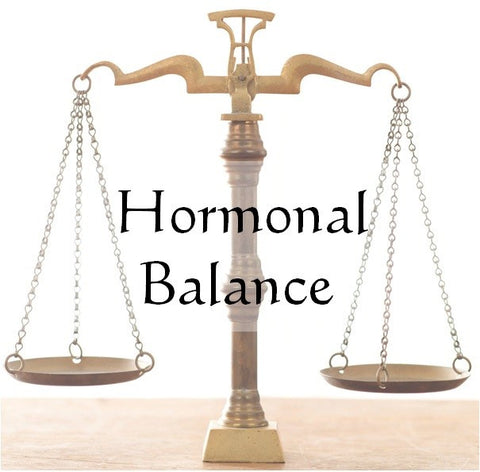
Are you experiencing any of the following?
- Unintentional weight loss or gain that can’t be explained by diet
- Depression and anxiety
- Ongoing fatigue
- Insomnia
- Digestive issues
- Hair loss or thinning
- Infertility and irregular periods
- Changes in appetite
Answering yes to one or more of the above conditions could indicate that you are experiencing hormonal imbalance. Before we talk about what this means, here is a brief overview of our endocrine system, which can be thought of as our hormone control system.
The endocrine system (coming from Greek words, “endo” meaning within and “crinis” meaning to secrete) is a collection of glands that produce hormones. Hormones are chemical messengers in the body that regulate the activity of cells and organ tissues- for pretty much everything. That’s a tall order. So, it makes sense that we want our hormones to be working as well as possible in order for our body to be in good health. Unlike the speed of the nervous system, signals sent through the endocrine system are generally slower but hold a longer response. (For more on the science of hormones, please scroll to the bottom of this post)
To give an example, a well-known gland of the endocrine system is the thyroid gland. The thyroid gland produces hormones that regulate vital bodily functions of breathing, heart rate, body temperature, cholesterol levels, metabolism, and more. The thyroid gland uses iodine from our diet to make two main hormones triiodothyronine (T3) and thyroxine (T4).

The balance of these hormones in the body is particularly important, and other glands in the body (hypothalamus and pituitary) will regulate their production- this works as a checks and balances system. However, if something occurs in the body that disrupts the levels of T3 and T4, and they are over or under produced, conditions like hyperthyroidism or hypothyroidism present themselves.

Causes of Hormone Imbalance
- Stress
- Lack of sleep and rest
- Genetics
- Overweight/Obesity
- Poor diet
- Sedentary lifestyle
- Toxin exposure
- Food allergies and digestive issues
- Aging
- Surgery/radiation/chemotherapy/drugs
As you can see, it’s not too difficult to be in a situation where you could alter your hormones. And unlike a physical injury such as breaking your leg, injury to the body due to hormone imbalance isn’t so easy to see or classify. Hormone imbalance doesn’t get a ton of attention, but it often has greater prolonged injury to the body than most conditions.
Taken from a trusted resource of mine, Dr. Axe, here are some specific problems associated with some of the most common hormonal imbalances:
- Estrogen dominance: changes in sleep patterns, changes in weight and appetite, higher perceived stress, slowed metabolism
- Polycystic Ovarian Syndrome (PCOS): infertility, weight gain, higher risk for diabetes, acne, abnormal hair growth
- Low estrogen: low sex drive, reproductive problems, menstrual irregularity, changes in mood
- Hypothyroidism: slowed metabolism, weight gain, fatigue, anxiety, irritability, digestive issues, irregular periods
- Low testosterone: erectile dysfunction, muscle loss, weight gain, fatigue, mood-related problems
- Hyperthyroidism & Grave’s Disease: anxiety, thinning hair, weight loss, IBS, trouble sleeping, irregular heartbeats
- Diabetes: weight gain, nerve damage (neuropathy), higher risk for vision loss, fatigue, trouble breathing, dry mouth, skin problems
- Adrenal fatigue: fatigue, muscle aches and pains, anxiety and depression, trouble sleeping, brain fog, reproductive problems
In general, conventional treatment of hormonal balances includes medication, hormone replacement therapy, or insulin injections. These methods, though sometimes medically necessary, create dependency on prescription drugs, mask underlying problems, and often have serious side effects themselves.
Here’s the thing- you can go get lab work done and see a specialist to determine if your hormone levels are in balance, or, you can take stock of your life and how you’re feeling, and decide to make the changes for yourself. I am not saying it isn’t appropriate for someone to see a physician if they have severe hormone imbalance issues, however, many of us have low-level and manageable states of hormone imbalance that can be fixed by taking the active steps ourselves to alter our lifestyles- and avoid a copay.
So I say to you, consider balancing your hormones naturally. This post isn’t meant to diagnose or treat someone with hormone imbalance, rather I want to spark interest in educating yourself and taking charge of your health! Here we go.
Nutrition and Hormone Balance
There are more specific diet guidelines for some hormone conditions, however, there are many great general principles for maintaining hormone levels within the body. I like to take a holistic approach with all things, so some of these suggestions are lifestyle shifts as well.
- Improve your diet
- I generally suggest decreasing consumption of wheat and sugar. Both of these contribute to excess inflammation in the body and can alter hormone levels. Replace typical wheat based foods with vegetable likes zucchini, sweet potatoes, acorn/butternut/spaghetti squash, cruciferous vegetables like brussels sprouts, broccoli, cauliflower- these are hearty vegetables that provide the body with tons of nutrition and don't make you feel like you're depriving yourself (you don't have to eat boring salads every day!). Bake 'em and dress them up with flavorful spices!
- High quality protein sources: grass-fed meat or wild-caught fish, preferably organic. Non-organic animal proteins are susceptible to synthetic hormone injections which are then consumed by us and circulate in our bodies affecting our own hormone levels.
- Other diet suggestions for good health: limit coffee to ~1 cup per day, no soda or diet soda, minimal alcohol consumption (for women the recommendation is ~1 drink per day, but the less the better)
- Minimize the amount of "processed food" in your diet. This can be a confusing term, but I consider processed food to be food with lengthy ingredient lists with additives, preservatives, dyes, artificial ingredients, etc. The more "whole foods" (food with minimal processing and modifications made to them) in your diet, the better! A lot of the fake ingredients in foods have negative effects on our hormone levels.
- Extra fun: increase the amount of fermented and cultured food in your diet. These foods have plenty of benefits to your health, and they are now becoming more mainstream and accessible for those unable to make their own. There are several companies selling fermented drinks and sauerkraut and kimchi products- most grocery stores are starting to carry them.
- Partake in daily movement
- Not necessarily strenuous exercise, but even just low-intensity activities like walking 4-6 days a week have shown major improvements in hormone levels (this includes insulin levels for my diabetics out there!), not to mention other physiologic benefits. Here, consistency is key!
- Balancing omega-3 and omega-6 consumption
- The balance of omega-6 to omega-3 should be around 1:1 to 6:1, however, today most people have a ratio closer to 20:1, or greater! This is due to the high amount of vegetable oils in the processed foods we are eating. Decreasing your processed food intake will help, but you can also consider omega-3 supplementation. I recommend krill oil versus fish oil supplementation as krill have a much higher antioxidant concentration than basic fish oil and are less susceptible to perishing. Fish oil can still be a good supplement to increase daily omega-3 intake, however.
- Get adequate Vitamin D
- Getting outside for 15 minutes to soak in some sun to form Vitamin D (a hormone!) has much deeper cellular effects on the body and hormone levels than many people are aware of. I promote actual sun exposure over supplementation, however, there are some good quality supplements out there if lab results show someone is truly deficient or unable to get outside for whatever reason.
- Love yourself
- Because, duh! Love goes a long way.
A Word on Menopause
Menopause in particular is a time where the creation of estrogen sharply decreases. Hotflashes are the most common noticeable side effect. Along with the above dietary and lifestyle suggestions, another nutritional component could be beneficial for this group.
Phytoestrogens
Since estrogen levels sharply decrease during menopause, a good strategy to combat this would be to moderately increase consumption of phytoestrogens during the pre-menopause phase. This will help buffer the effects of the sharp decrease normally experienced. Phytoestrogens are plant-based estrogens which haven’t quite had their spotlight in the realm of nutrition. This is a newly emerging area of attention and research is still determining their benefits. Phytoestrogens are dietary estrogens, meaning they cannot be made by the body and must be consumed from food sources. They are not considered “nutrients” either, since they are not essential to the human diet. Phytoestrogens both mimic estrogen and act as estrogen antagonists. The most common phytoestrogens are soy derivatives, however, other sources include tempeh, flax, licorice, alfalfa, oats, barley, lentils, sesame seeds, yams, apples, carrots, pomegranates, wheat germ, licorice root, and red clover. I will say that I personally do not recommend the consumption of unfermented soy products.
Supplemental Solutions (not prescribing, simply suggesting a look into them)
- Royal Maca- Must find a high quality source. Maca root is a cruciferous root vegetable and it's powder is commonly sold. It is a known adatogen, meaning it can alleviate the effects of stress on the body and balance hormone levels naturally.
- Black Cohosh- Doesn't work for everyone, but it has been shown to help with hot flashes
Final Thoughts
So that’s it for now! This was a brief look into the role hormones play in our body and on our health. Optimal nutrition is key for good health and wellbeing, as always. This post was inspired by an email I received, so feel free to email me at sherry@katiesplates.com with any further questions or on another nutrition related topic. You could be the inspiration for the next post!
XO Sherry
Sources
https://draxe.com/10-ways-balance-hormones-naturally/
http://healthyeating.sfgate.com/endocrine-system-nutrition-4469.html
http://articles.mercola.com/sites/articles/archive/2009/12/15/the-menopause-thyroid-solution.aspx
For those interested in going the extra science-mile
Hormones are generally classified into four major categories: steroids, peptides, amines, and eicosanoids. Some examples include:
- Steroids- estrogens, androgens, progesterone cortisol, aldosterone, Vitamin D
- Peptide- human growth hormone (HGH), insulin, parathyroid hormone, melatonin, ghrelin, leptin
- Amines- epinephrine, norepinephrine, T3, T4
- Eicosanoids- prostaglandins (think of the inflammation reaction)
Like I said earlier, the endocrine system is responsible for the major network of hormone producing glands, however, there are other organs involved in secreting hormones (nothing is ever neatly compartmentalized in our very complex body!) Your stomach can produce hormones (“ghrelin” is an appetite regulating hormone), the placenta produces hormones, fat cells produce hormones (leptin), and even more tissues are being found to produce hormones!
